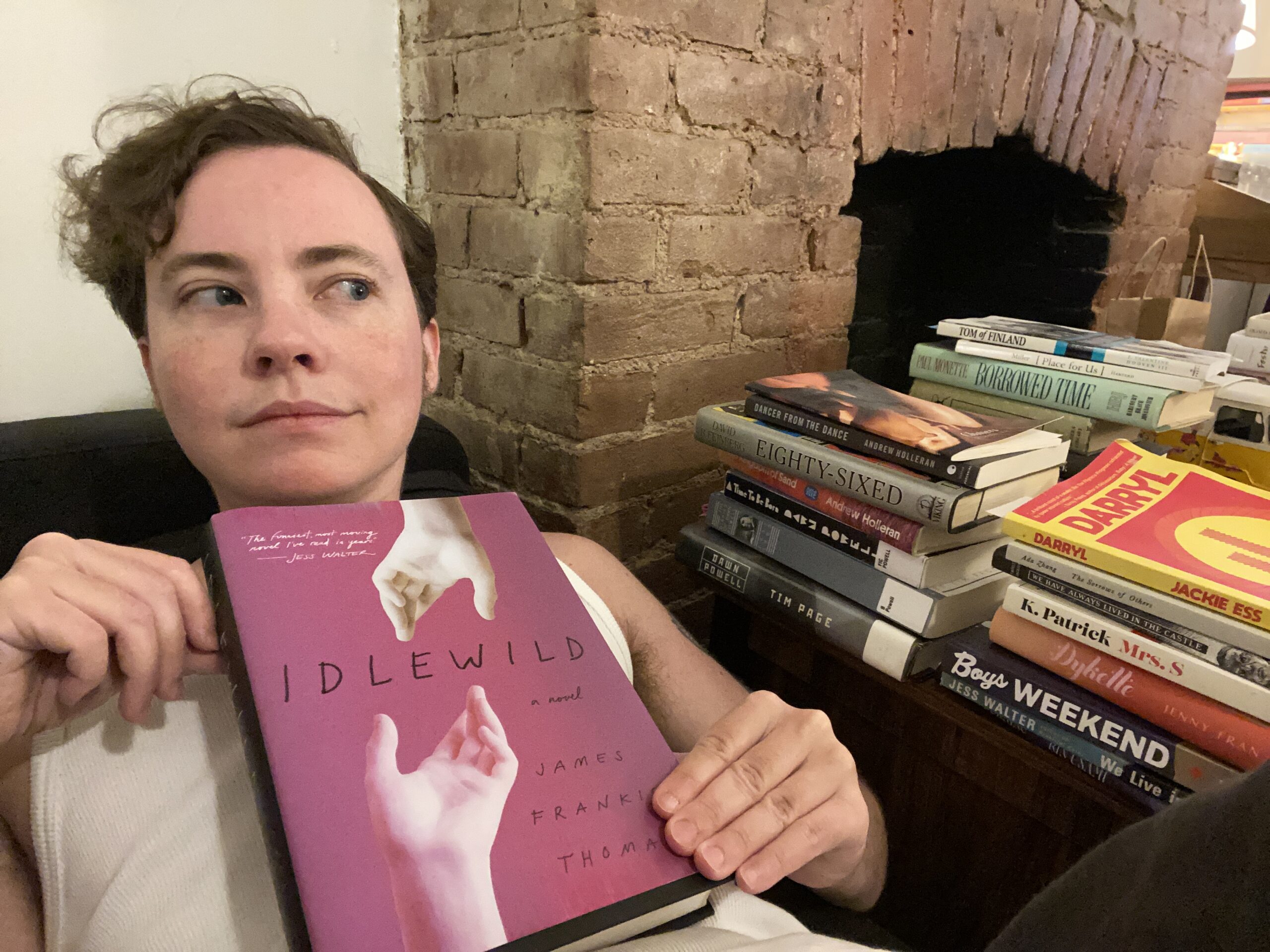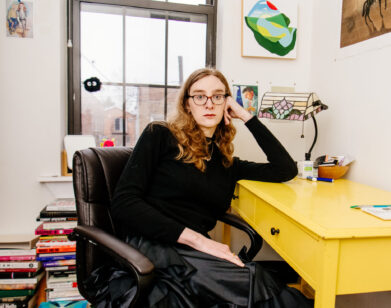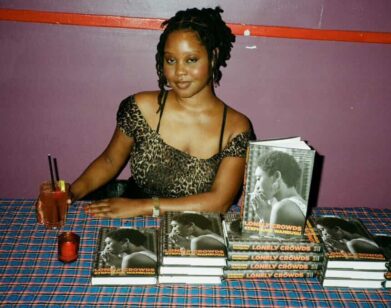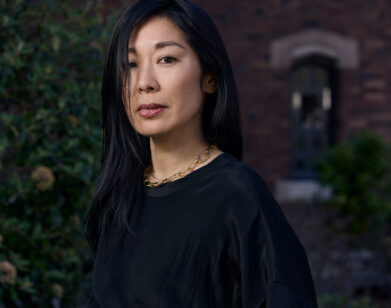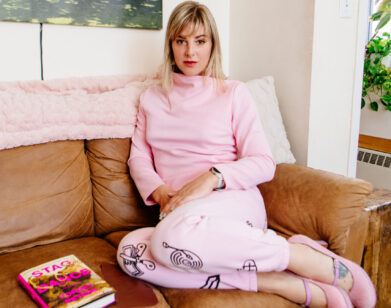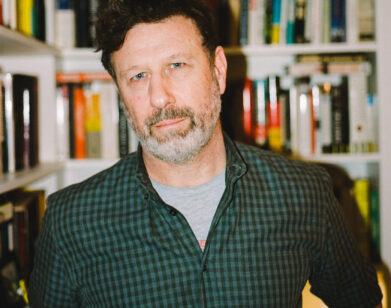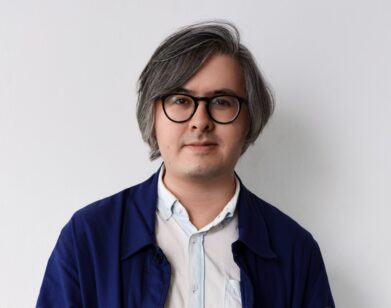OPEN BOOK
James Frankie Thomas Tells Us His Favorite Campus Novels
This is OPEN BOOK, a monthly column in which we ask debut authors about their reading and writing habits. Last month, we spoke with Yepoka Yeebo about her fraudster exposé Anansi’s Gold. For this month’s installment, we tapped James Frankie Thomas, whose debut novel Idlewild tells a dark and biting story of friendship among queer youth. The lives of the main characters, Fay and Nell, converge in the meetinghouse of their private Quaker high school in lower Manhattan on the same day that as the 9/11 attacks. Eventually, the vectors of identity, love, and friendship start to cross—which is often the case in high school theater departments. Just before Idlewild hit shelves this week, we asked the author to complete our OPEN BOOK questionnaire, in which he itemizes his writing desk talismans and tells us what constitutes the ideal reading experience.
———
Where do you like to write?
At my writing desk, the only furniture I brought to my apartment. (The rest I inherited from the previous tenant.) I put it by the window so I can birdwatch and spy on my neighbors and, in summer, blast the air conditioner directly on my body (I run very hot). At eye level I keep an array of talismanic objects, including: four vintage pin buttons that say KEEP IT GAY, RADICAL FAIRY, QUEER BOY and WE ARE EVERYWHERE. They were a gift from my agent, Ayla Zuraw-Friedland; a rainbow unicorn rubber duck, a bathroom freebie from a Radisson hotel in Charlotte, NC. I’ve wrapped him in a rubber bracelet from the Bike Stop leather bar in Philadelphia; miniature faux marble busts of Apollo and Dionysus, a romantic gift from a recent boyfriend (I was Apollo, he was Dionysus). They’re 3D printed and so flimsy that Dionysus arrived decapitated, but I think it suits him.
When do you like to write?
Afternoon. I need two cups of coffee at minimum before I’m psychologically prepared to start writing, and I can’t write too close to bedtime or else I can’t shut off my brain to sleep. (Update: I wrote this answer before bed and was then unable to fall asleep. I don’t know what I expected.)
Idlewild takes place at a Manhattan prep school. What are your favorite campus novels?
Obviously I immediately have to scream The Secret History by Donna Tartt. That’s the King James Bible for boys like me, and it’s an influence on Idlewild in the same sense that Shakespeare is an “influence” on English theater. But I actually don’t think of Idlewild as a campus novel; I would classify it as a school story, which I think is a separate genre even when the school’s campus is central to the narrative. (After all, the Harry Potter books aren’t campus novels.) As a school story, Idlewild is a direct descendant of Curtis Sittenfeld’s Prep, which is up there with The Secret History as one of my all-time favorites. Another beloved ancestor is Alan Bennett’s The History Boys, which is a play, not a novel. I was lucky enough to see it on Broadway in 2006, and I own the published play and re-read it regularly.We’re currently in the midst of a golden age of school stories. Some recent ones I’ve loved were Susan Choi’s Trust Exercise, Sarah Thankam Mathews’s short story “Rubberdust,” and Colson Whitehead’s The Nickel Boys (which is more like a prison story, but genre-wise I consider it an extremely grim school story).
What’s the first thing you did after you turned in a draft of your book?
Went for a walk along the Hudson River, then realized mid-walk that I’d left out something crucial. The draft included two instances of a character playing the word cocksucker in a game of Hangman; I’d forgotten to implement my agent’s note that once is funny, twice looks accidental, and three times is a running gag. I raced home and emailed my editor a third cocksucker Hangman passage, asking her to insert it into the epilogue.
Tell us about three to five books you read while writing your own, and why?
At the suggestion of my mentor and thesis advisor, Lan Samantha Chang, I read two novels by William Maxwell. First she lured me into reading The Folded Leaf by telling me it was gay. I read the whole damn thing waiting for the gay part, and finally, at the very end, I reached these two sentences: “Spud leaned forward slowly and kissed Lymie on the mouth. He had never done this before and he was never moved to do it again.” I was so mad, I could have thrown the book across the room. But her other Maxwell recommendation, So Long, See You Tomorrow, did end up influencing Idlewild–I essentially lifted its framing device, in which a character recognizes an old friend and doesn’t say hi.
During this same period, I was trying really hard not to transition, so to satisfy the urge I was reading every trans book I could get my hands on. Imogen Binnie’s Nevada was my favorite, and it gave me permission to let my own character’s transness be implicit throughout, rather than laboriously spelled out for the cis reader and neatly resolved at the end. Jordy Rosenberg’s Confessions of the Fox was also unexpectedly helpful: I’d been struggling with how to format my annotated fanfic chapters, and Confessions of the Fox made me realize that David Foster Wallace didn’t have a permanent monopoly on the footnote. Another book I read and adored during that time was Dennis Cooper’s The Sluts. I read it in a single sitting. It was useful for immersing myself in the early-2000s Internet that plays such an important role in Idlewild, but I wasn’t reading it for utilitarian reasons. I just loved it.
Tell us about a formative early reading experience.
For Christmas 1995, when I was eight, my uncle Alexander gave me The Calvin and Hobbes Tenth Anniversary Book. That was the same Christmas we got the puppy I’d been begging for, so the book wasn’t the best present I got, but it was a pretty close second. I was a Calvin and Hobbes obsessive and would have gleefully devoured any Calvin and Hobbes book, but unlike previous treasury collections, the Tenth Anniversary Book was heavily annotated with Bill Watterson’s commentary on each strip. Like any great artist, he was highly self-critical, and he went into a lot of detail about artistic choices he regretted. It was the first time I’d ever seen an adult discuss his own failures so openly and thoughtfully, and it riveted me. The reading difficulty level was absurdly high for an eight-year-old, but that was true for Calvin and Hobbes in general, so I was used to Watterson’s big words and well-practiced at inferring their meaning from context clues. Through sheer willpower I absorbed sentences like “I’m not at all familiar with film noir or detective novels, so these are just spoofs on the clichés of the genre,” along with new concepts like “licensing,” “bootleg merchandise,” and “sabbatical.” (I admit I still don’t entirely understand what “the syndicate” is.) To this day, I love reading criticism and artists on their own work, and I can’t believe how lucky I was to get such an early head start thinking about artistic integrity. Thank you, Alexander!
The last book you loved, and why?
I just started reading Darryl by Jackie Ess, and I’m loving it so much I stayed up too late last night because I didn’t want to put it down. I have absolutely no idea where the story is going, which is blissfully destabilizing, like a weird new drug. The narrator has this dazed, doleful voice that cracks me up and makes me wish I had someone to read it aloud to.
The last book I loved, past tense, was Vladimir by Julia May Jonas. It was recommended to me by a friend who interpreted the main character as a thwarted gay trans man, so I read it through that lens, and it’s amazing how well it fit and enriched the text. But it’s a phenomenally great read even if you take it at face value that the narrator is a middle-aged woman who hates being a woman and channels her self-disgust into an erotic obsession with a hot younger man. It’s not just funny and gripping but sensual, so deeply grounded in the characters’ embodied physicality. It made me laugh, it made me lose time, it even made me hungry–the lavish food descriptions inspired me to invent a new recipe.
The last book that disappointed you, and why?
Nice try, Regina George.
Hardcover or paperback? Why?
Paperback, because of my weak, delicate little hands. But I appreciate a really nice paperback, the kind whose cover has a built-in flap you can use as a bookmark.
A book you think should be in the canon, but isn’t:
A Time to Be Born by Dawn Powell, published in 1942. Dawn Powell (1896-1965) is one of those authors who’s sort of famous for not being famous, and her fans often talk about her like she’s a sad shelter dog no one will adopt, which probably turns off people who would otherwise love her. Dawn Powell is not homework or vegetables or a charity case, she’s a delight, and I’m jealous of anyone who hasn’t read A Time to Be Born because they get to read it for the first time. It’s about a social-climbing media star in New York City, Amanda Keeler, who takes under her wing a naïve former schoolmate from Ohio, Vicky Haven, as part of a secret scheme. The point of view alternates between steely psychopathic Amanda and droll observant Vicky, and it’s riotously funny and surprisingly tender and a brutally accurate satire of New York City life, even now. It ought to be as iconic as The Great Gatsby.
A book you think shouldn’t be in the canon, but is:
I sort of dispute the premise of this question. To quote one of my favorite critics, Daniel Mendelssohn: “Canons aren’t drawn up like shopping lists; they grow organically, just as genres and styles do, out of the soil of the culture that produces them.” But if you’re really granting me the godlike power to reverse that process, let’s go with American Pastoral. If plays count, I also think it’s wild that The Crucible is still taken seriously.
What’s your favorite bookstore(s)?
The Drama Book Shop on West 39th Street. It specializes in plays and theatrical books, but their selection is vast and the vibes are impeccable. Last summer, when I was reviewing a production of the Oresteia, they let me hang out all day in a leather armchair reading every translation of the Oresteia. Every time I go in there, all the customers are visibly queer and jaw-droppingly hot, I guess because they’re all actors.
What do you look for in a reading experience?
Yearning (preferably gay yearning), a vivid sense of place, a page-turning plot, a sense of humor that doesn’t flatten the humanity of the characters, and dialogue in quotation marks.
How do you arrange your bookshelf?
Bold of you to assume I have a bookshelf. My studio apartment is so tiny, I barely have books. I left behind all my books at my ex-husband’s place. For three years now he’s been politely asking me to come get them, and I keep telling him I will soon, but I’m lying. I’ve accrued new books in the last three years, but I just stack them in random piles on my coffee table. I try to make sure Stephen Ira’s poetry chapbook Chasers and an illustrated biography of Tom of Finland are always visible at the top of the stacks, but as I write this, Tom of Finland is obscured by a self-published book given to me by a man from Grindr. A bookshelf would be a good storage solution, but there’s just no room for one, and I refuse to find another apartment. So I’ll just keep stacking my books until they topple over and I’m crushed to death like the Collyer brothers. There are worse ways to go.

